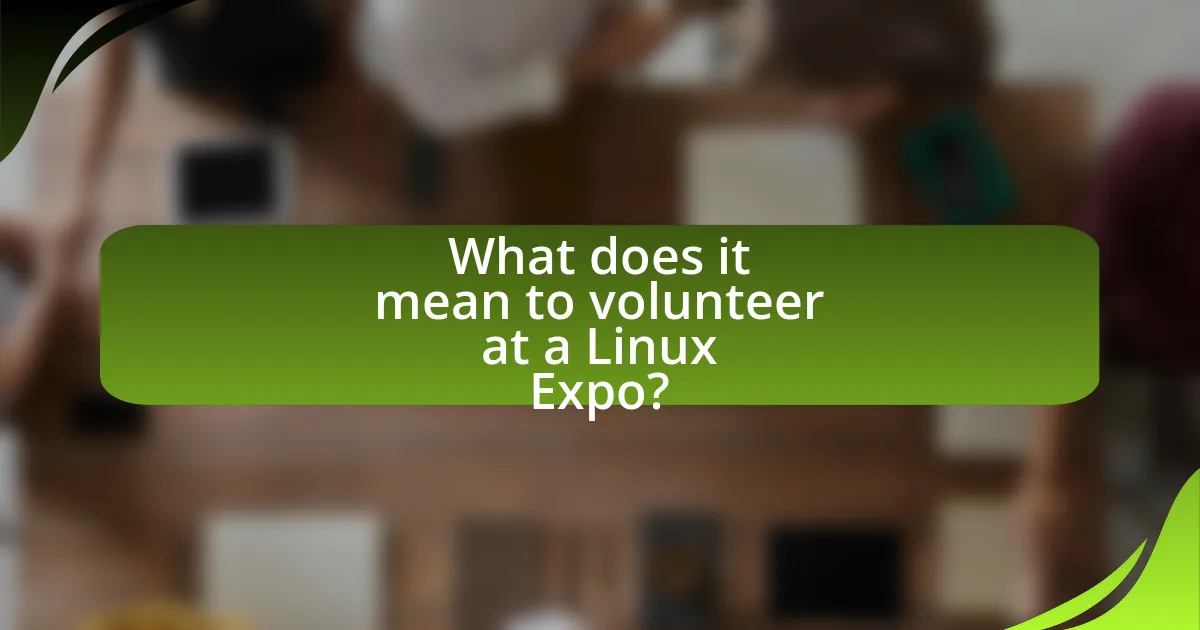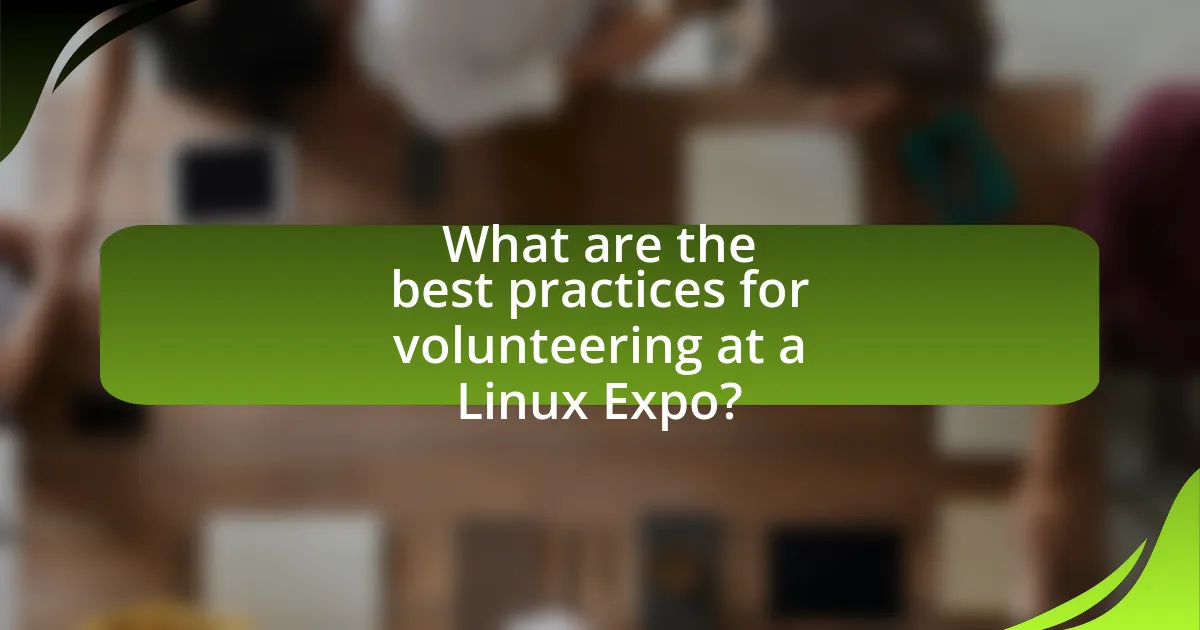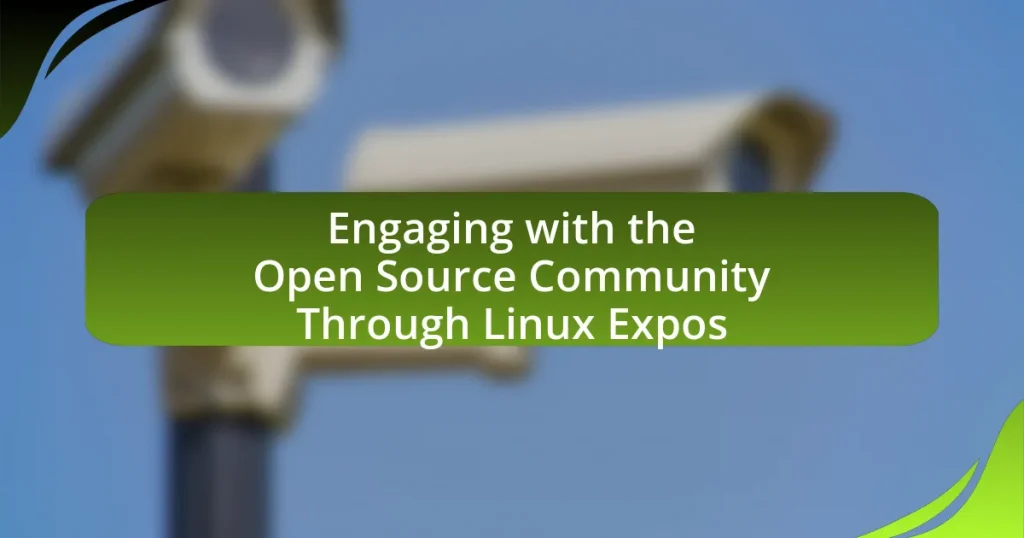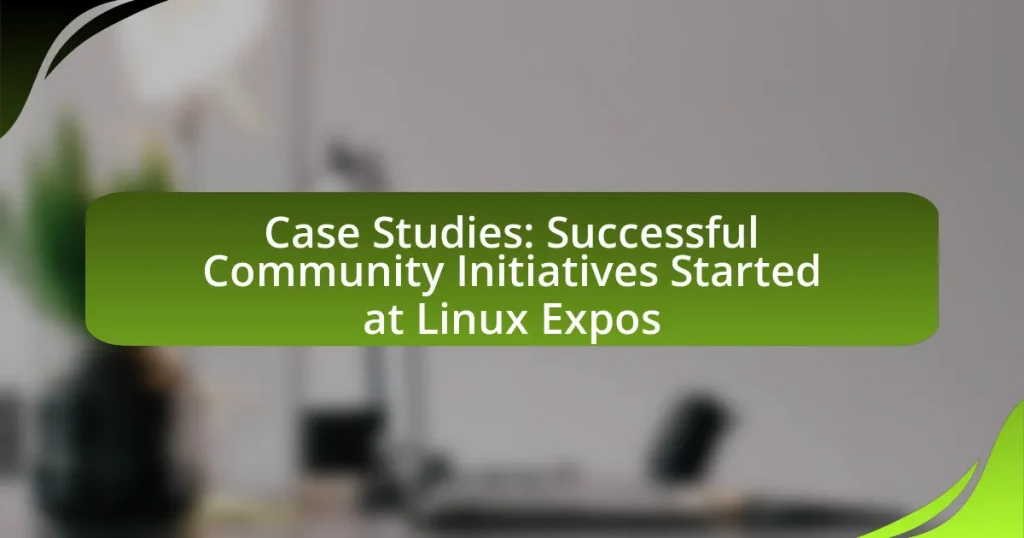Volunteering at a Linux Expo involves assisting with various tasks such as registration, guiding attendees, managing sessions, and providing technical support, which are essential for the event’s smooth operation. Newcomers are encouraged to volunteer to gain hands-on experience, enhance their technical skills, and network with industry professionals. The article outlines the roles available for volunteers, the application process, and how to prepare for the experience, while also highlighting the personal and community benefits of volunteering. Additionally, it discusses best practices for effective volunteering, common challenges faced, and resources available post-event for continued engagement in the Linux community.

What does it mean to volunteer at a Linux Expo?
Volunteering at a Linux Expo means actively participating in the event by assisting with various tasks such as registration, guiding attendees, managing sessions, and providing technical support. Volunteers play a crucial role in ensuring the smooth operation of the expo, which typically features presentations, workshops, and networking opportunities focused on Linux and open-source technologies. This involvement not only helps the event run efficiently but also allows volunteers to gain valuable experience, connect with industry professionals, and deepen their understanding of Linux and open-source communities.
Why should newcomers consider volunteering at a Linux Expo?
Newcomers should consider volunteering at a Linux Expo to gain hands-on experience and network with industry professionals. Volunteering provides an opportunity to learn about open-source technologies, interact with experts, and participate in workshops, enhancing both technical skills and industry knowledge. Additionally, events like the Linux Expo often attract thousands of attendees, creating a vibrant environment for making valuable connections that can lead to future career opportunities.
What are the personal benefits of volunteering at a Linux Expo?
Volunteering at a Linux Expo offers personal benefits such as skill development, networking opportunities, and enhanced knowledge of open-source technologies. Participants can gain hands-on experience in event organization and technical support, which can improve their resumes and professional profiles. Additionally, volunteering allows individuals to connect with industry professionals and like-minded enthusiasts, fostering relationships that can lead to future job opportunities or collaborations. Engaging with the latest advancements in Linux and open-source software during the expo further deepens one’s understanding and expertise in the field.
How does volunteering contribute to the Linux community?
Volunteering significantly contributes to the Linux community by fostering collaboration, enhancing project development, and expanding outreach. Volunteers provide essential support in organizing events, such as Linux expos, which facilitate networking and knowledge sharing among developers and users. This active participation helps maintain and improve Linux distributions, as volunteers often contribute code, documentation, and testing, which are critical for the software’s evolution. For instance, the Linux kernel has seen contributions from thousands of volunteers, leading to its robust development and widespread adoption. Additionally, volunteering promotes inclusivity and diversity within the community, encouraging new contributors to engage and learn, thereby sustaining the ecosystem’s growth and innovation.
What roles are available for volunteers at a Linux Expo?
Volunteers at a Linux Expo can take on various roles, including registration assistance, session moderation, technical support, and logistics coordination. Registration assistants help attendees check in and distribute materials, while session moderators facilitate discussions and manage Q&A segments. Technical support volunteers provide assistance with equipment and software, ensuring smooth presentations. Logistics coordinators handle the setup and breakdown of event spaces, manage supplies, and assist with crowd control. These roles are essential for the successful operation of the expo, contributing to a positive experience for both attendees and exhibitors.
What are the different types of volunteer positions?
Different types of volunteer positions at a Linux Expo include registration assistance, technical support, event coordination, and outreach roles. Registration assistance involves helping attendees check in and providing them with materials. Technical support focuses on troubleshooting equipment and ensuring smooth operation of presentations. Event coordination entails managing schedules and logistics to facilitate activities. Outreach roles involve promoting the event and engaging with the community to increase participation. Each position plays a crucial role in the overall success of the expo, ensuring a positive experience for both volunteers and attendees.
How can volunteers choose the right role for their skills?
Volunteers can choose the right role for their skills by assessing their strengths and interests in relation to the needs of the event. This involves identifying personal skills such as technical expertise, communication abilities, or organizational talents, and then matching these with specific volunteer roles available at the Linux Expo, such as technical support, registration assistance, or event coordination. Research indicates that aligning personal skills with volunteer tasks increases job satisfaction and effectiveness, as seen in studies by the Corporation for National and Community Service, which highlight that volunteers who engage in roles that suit their skills are more likely to have positive experiences and contribute meaningfully to the organization.
What is the process for signing up to volunteer?
To sign up to volunteer at a Linux Expo, interested individuals must complete an online application form available on the event’s official website. This form typically requires personal information, availability, and areas of interest related to volunteering roles. After submission, applicants receive a confirmation email and further instructions regarding orientation and training sessions, ensuring they are prepared for their responsibilities.
How do newcomers find volunteer opportunities at a Linux Expo?
Newcomers find volunteer opportunities at a Linux Expo primarily through the event’s official website, which typically lists available roles and application procedures. Additionally, social media platforms and community forums related to Linux and open-source software often share announcements about volunteer positions. Many expos also have dedicated mailing lists or newsletters that provide updates on volunteer opportunities, ensuring that newcomers can easily access relevant information.
What information is typically required during the application process?
During the application process to volunteer at a Linux Expo, typically required information includes personal details such as name, contact information, and availability. Additionally, applicants may need to provide relevant experience or skills related to Linux or event volunteering, as well as any specific preferences for roles or tasks they wish to undertake during the event. This information helps organizers match volunteers to suitable positions and ensures a smooth operation of the expo.

How can newcomers prepare for their volunteer experience?
Newcomers can prepare for their volunteer experience by researching the specific roles and responsibilities associated with volunteering at a Linux Expo. Understanding the event’s schedule, the technology being showcased, and the overall mission of the expo will enhance their effectiveness. Additionally, newcomers should familiarize themselves with the tools and software relevant to the event, as well as any specific guidelines provided by the organizers. Engaging with previous volunteers or attending preparatory meetings can also provide valuable insights and tips for a successful experience.
What skills should volunteers develop before the event?
Volunteers should develop communication, teamwork, and technical skills before the event. Effective communication is essential for interacting with attendees and other volunteers, ensuring clear information exchange. Teamwork skills are crucial for collaborating efficiently with diverse groups, which is common in event settings. Technical skills, particularly related to Linux systems and software, enhance volunteers’ ability to assist attendees and troubleshoot issues, as the Linux Expo focuses on open-source technologies. These skills collectively prepare volunteers to contribute effectively and enhance the overall event experience.
How can volunteers improve their technical knowledge related to Linux?
Volunteers can improve their technical knowledge related to Linux by participating in hands-on workshops and training sessions offered at Linux expos. These events often feature expert-led sessions that cover various aspects of Linux, including system administration, shell scripting, and open-source software development. Engaging in these practical experiences allows volunteers to apply theoretical knowledge in real-world scenarios, enhancing their understanding. Additionally, collaborating with experienced Linux users and developers during the expo can provide valuable insights and mentorship opportunities, further solidifying their technical skills.
What soft skills are important for effective volunteering?
Effective volunteering requires strong communication skills, empathy, teamwork, adaptability, and problem-solving abilities. Communication skills enable volunteers to convey information clearly and collaborate effectively with others. Empathy allows volunteers to understand and connect with the needs of the community they serve. Teamwork is essential for working harmoniously with diverse groups, while adaptability helps volunteers respond to changing situations and challenges. Problem-solving skills are crucial for addressing unexpected issues that may arise during volunteer activities. These soft skills enhance the overall impact of volunteering efforts and contribute to a positive experience for both volunteers and the communities they support.
What should volunteers expect on the day of the event?
Volunteers should expect to engage in various tasks that support the smooth operation of the Linux Expo on the day of the event. These tasks typically include setting up registration booths, assisting attendees with inquiries, distributing materials, and ensuring that sessions run on schedule. Volunteers will also likely participate in team briefings to understand their roles and responsibilities clearly, which is essential for effective coordination. Additionally, volunteers can anticipate a dynamic environment with opportunities to network with attendees and other volunteers, enhancing their experience and knowledge of the Linux community.
How can volunteers manage their time effectively during the Expo?
Volunteers can manage their time effectively during the Expo by creating a detailed schedule that prioritizes tasks and includes breaks. This approach allows volunteers to allocate specific time slots for various responsibilities, ensuring that they remain organized and focused. Research indicates that structured time management techniques can enhance productivity by up to 25%, as they help individuals avoid distractions and maintain a steady workflow. By adhering to a well-planned schedule, volunteers can maximize their contributions while also ensuring they have time to engage with attendees and participate in activities.
What are common challenges volunteers might face, and how can they overcome them?
Common challenges volunteers might face include time management, lack of experience, and communication barriers. To overcome time management issues, volunteers can create a schedule that prioritizes their commitments and allows for flexibility. Lack of experience can be addressed by seeking guidance from experienced volunteers or organizers, who can provide training and support. Communication barriers can be mitigated by actively engaging in team meetings and utilizing clear, concise language to ensure understanding among diverse groups. These strategies help volunteers effectively navigate their roles and contribute positively to the event.

What are the best practices for volunteering at a Linux Expo?
The best practices for volunteering at a Linux Expo include being well-prepared, actively engaging with attendees, and understanding the event’s schedule and layout. Preparation involves familiarizing oneself with the Linux community, the specific technologies being showcased, and the goals of the expo. Engaging with attendees means being approachable, answering questions, and facilitating discussions about Linux and open-source software. Understanding the event’s schedule and layout allows volunteers to guide attendees effectively and ensure smooth operations. These practices enhance the overall experience for both volunteers and attendees, contributing to the success of the expo.
How can volunteers make the most of their experience?
Volunteers can make the most of their experience by actively engaging with attendees and fellow volunteers, which enhances networking opportunities and skill development. By participating in various tasks, such as assisting with registration, managing sessions, or providing technical support, volunteers gain hands-on experience that is valuable in the tech community. Research indicates that active participation in volunteer roles leads to increased job satisfaction and professional growth, as highlighted in a study by the Corporation for National and Community Service, which found that volunteers develop new skills and expand their professional networks through engagement.
What networking opportunities should volunteers look for?
Volunteers at a Linux Expo should look for networking opportunities such as connecting with industry professionals, engaging with fellow volunteers, and participating in workshops or panel discussions. These interactions can lead to valuable relationships and insights into the Linux community. For instance, attending sessions where experts share their knowledge allows volunteers to ask questions and establish rapport, which can be beneficial for future collaborations or job opportunities. Additionally, informal gatherings or social events during the expo provide a relaxed environment for volunteers to meet others who share similar interests and goals in technology and open-source software.
How can volunteers contribute to a positive atmosphere at the Expo?
Volunteers can contribute to a positive atmosphere at the Expo by actively engaging with attendees and providing assistance. Their presence fosters a welcoming environment, as they can answer questions, guide participants, and facilitate interactions among guests. Studies show that events with engaged volunteers report higher satisfaction rates among attendees, indicating that volunteer involvement directly correlates with a positive experience.
What resources are available for volunteers after the event?
Volunteers after the event have access to various resources, including feedback surveys, networking opportunities, and training materials. Feedback surveys allow volunteers to share their experiences and suggestions for future events, which can enhance their involvement in subsequent activities. Networking opportunities may include follow-up events or online forums where volunteers can connect with each other and organizers, fostering community engagement. Additionally, training materials provided post-event can help volunteers improve their skills and prepare for future volunteering roles, ensuring they remain informed about best practices and developments in the Linux community.
How can volunteers stay connected with the Linux community post-Expo?
Volunteers can stay connected with the Linux community post-Expo by joining online forums, mailing lists, and social media groups dedicated to Linux. Engaging in platforms like the Linux Foundation’s mailing lists or participating in discussions on Reddit and Stack Overflow allows volunteers to maintain relationships and share knowledge. Additionally, attending local Linux user group meetings and contributing to open-source projects on GitHub fosters ongoing collaboration and community involvement. These methods are effective as they provide continuous access to resources, updates, and networking opportunities within the Linux ecosystem.
What opportunities exist for further involvement in future events?
Opportunities for further involvement in future Linux Expo events include becoming a regular volunteer, participating in planning committees, and engaging in community outreach initiatives. Regular volunteers can gain experience and build connections, while planning committees often seek input from dedicated individuals to enhance event quality. Community outreach initiatives allow volunteers to promote the expo and engage with local tech communities, fostering a broader interest in Linux and open-source technologies. These roles not only contribute to the success of future events but also provide valuable networking and learning experiences for volunteers.
What tips can help newcomers succeed as volunteers at a Linux Expo?
Newcomers can succeed as volunteers at a Linux Expo by being proactive, engaging with attendees, and familiarizing themselves with the event schedule and key topics. Proactivity allows volunteers to anticipate needs and assist where necessary, enhancing the overall experience for attendees. Engaging with attendees fosters a welcoming atmosphere and encourages networking, which is vital in the open-source community. Familiarizing oneself with the event schedule and key topics ensures that volunteers can provide accurate information and support, contributing to a smoother operation of the expo. These strategies are supported by the collaborative nature of open-source events, where active participation and knowledge sharing are highly valued.



